Prex J.D.V. Ybasco's Blog, page 6
May 15, 2021
A Reader’s Response to Emily Barr’s “Things to Do Before the End of the World”#TheWriteReads #UltimateBlogTour

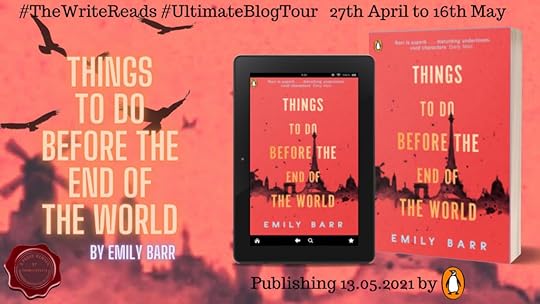 DISCLAIMER: THE WRITE READS AND PENGUIN PROVIDED ME AN E-ARC OF THE NOVEL tHINGS TO DO BEFORE THE END OF THE WORLD BY EMILY BARR IN EXCHANGE FOR AN HONEST REVIEW. Summary I got from Goodreads:
DISCLAIMER: THE WRITE READS AND PENGUIN PROVIDED ME AN E-ARC OF THE NOVEL tHINGS TO DO BEFORE THE END OF THE WORLD BY EMILY BARR IN EXCHANGE FOR AN HONEST REVIEW. Summary I got from Goodreads:One minute you’re walking in the park, hiding from a party. Then you discover that the next nine months will probably be your last. Everyone’s last. You realise that you happen to be alive at the time when your species becomes extinct.
You have to decide whether to go with it meekly like you usually do, or to do something brave, to live your last months with all the energy and bravery you can muster, to rage against the dying of the light.
Olivia struggles to live her real life as fully as she wants to. She plans out conversations and events in her head but actually doing them and interacting with other people is hard. When the news breaks that humans have done such damage to the earth that there’s only nine months of safe air left everybody makes bucket lists and starts living their best lives – everyone, that is, but Olivia who is still struggling to figure out who she wants to be.
Then out of the blue comes contact from a long-lost cousin Olivia didn’t even know exsisted. Natasha is everything Olivia wants to be and more. And as the girls meet up for their last summer on earth Olivia finds Natasha’s ease and self-confidence having a effect on her. But what if Natasha isn’t everything she first appears to be . . . ?

“I started out working as a journalist in London, but always hankered after a quiet room and a book to write. I managed, somehow, to get commissioned to go travelling for a year, and came home with the beginnings of a novel set in the world of backpackers in Asia. This became Backpack, a thriller which won the WH Smith New Talent Award, and I have since written eleven more novels for adults, one novella, a sci-fi horror novel and four book for Young Adults, published in the UK and around the world. I live in Cornwall with my husband Craig and our children.“
Bio
My Thoughts on Things to Do Before the End of the WorldIt's publication day at last! After its pandemic-delay I am so totally delighted to see it out there
— Emily Barrpic.twitter.com/80pr799wol
(@emily_barr) May 13, 2021
I thought it would be fun to use a listicle to share my two-cents in this novel:
Having a To-Do List or bucket list as chapter titles is smart and very creative particularly since the world is about to end in the novel. It also follows the current trend of presenting information: listicles. More than this however, I find the chapter titles to be an attempt to regain control of one’s life after dealing with a manipulator.The use of past tense already gives away what happens after the Creep. Unless of course it was Libby who managed to upload herself to the mainframe. Libby gets her first encounter with a creep: her cousin, Natasha. Natasha perfectly embodies Libby’s description of the creep, the environmental concern that will bring about the annihilation of living creatures. They come into Libby’s life unexpectedly and yet affect her life and her family gradually. They are both dangerous and creepy. Some red flags in a manipulative relationship have been captured pretty well in the novel including the manipulator being charming, using excessive flattery and sometimes guilt to make the other person do things, and isolating the victim. I am not sure what Emily Barr’s intentions were and I’m not in the position to assume but many victims of manipulation aren’t as lucky as Libby to have a rich father who can immediately go to Paris upon hearing his daughter’s misadventure and save her from her manipulator’s well-orchestrated troubles. Saying this might seem as victim blaming for others, but factually speaking, Libby has the choice and the faculty of acting on that choice to go against Natasha’s manipulation until that scene in Paris. She has had the support of her family members. She has the resources to leave Natasha when she wants to. Although Natasha’s grand scheme is hidden from her, Libby is aware that the cousin she has just met is trying to pull her leg and even makes fun about her eccentricity with her only friend, Max. For victims of manipulators, awareness is one luxury they don’t have. Extremely and painfully shy and awkward, Zoe allows herself to be pulled and manipulated because confident Natasha is what Libby wants to be, yes, albeit only having some months left on Earth. Libby’s drafts for Zoe is endearing. In writing those letters, she’s her utmost, honest self. How Libby remembers only Zoe’s phone number and gets the courage to call her in her dire need is a testament to her sincere feelings.Having my family, a loved-one, a friend as integral units of my identity would be evident to me without letting myself be manipulated by someone I barely knew. Being honest with myself, what I found acceptable or shitty would also be evident to me without the creep. Performing magic tricks, deliberately taking advantage of people and allowing someone else- again, a cousin I only found out about some weeks ago- to make decisions for me might not be the way I’d spend my limited time on Earth. I don’t think it is an act of bravery or rage against the dying of light.

April 30, 2021
Overreading Becky Albertalli’s “Kate in Waiting” #TheWriteReads #UltimateBlogTour

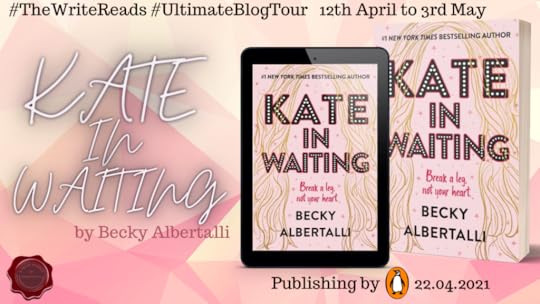 DISCLAIMER: THE WRITE READS and PENGUIN PROVIDED ME AN E-ARC OF THE NOVEL, KATE IN WAITING BY BECKY ALBERTALLI IN EXCHANGE FOR AN HONEST REVIEW.
DISCLAIMER: THE WRITE READS and PENGUIN PROVIDED ME AN E-ARC OF THE NOVEL, KATE IN WAITING BY BECKY ALBERTALLI IN EXCHANGE FOR AN HONEST REVIEW.Interpretations are my own and may not reflect the author’s intention. If they did, that would be cool. Analysis may contain spoilers or highly condensed scenes in the book. Spoilers nonetheless so be warned.
Summary I got from Goodreads:Contrary to popular belief, best friends Kate Garfield and Anderson Walker are not codependent. Carpooling to and from theater rehearsals? Environmentally sound and efficient. Consulting each other on every single life decision? Basic good judgment. Pining for the same guys from afar? Shared crushes are more fun anyway.
But when Kate and Andy’s latest long-distance crush shows up at their school, everything goes off script. Matt Olsson is talented and sweet, and Kate likes him. She really likes him. The only problem? So does Anderson.
Turns out, communal crushes aren’t so fun when real feelings are involved. This one might even bring the curtains down on Kate and Anderson’s friendship.
Author’s BioBecky Albertalli is the author of the acclaimed novels Simon vs. the Homo Sapiens Agenda (film: Love, Simon), The Upside of Unrequited, and Leah on the Offbeat. She is also the co-author of What If It’s Us with Adam Silvera. A former clinical psychologist who specialized in working with children and teens, Becky lives with her family in Atlanta. You can visit her online at www.beckyalbertalli.com.
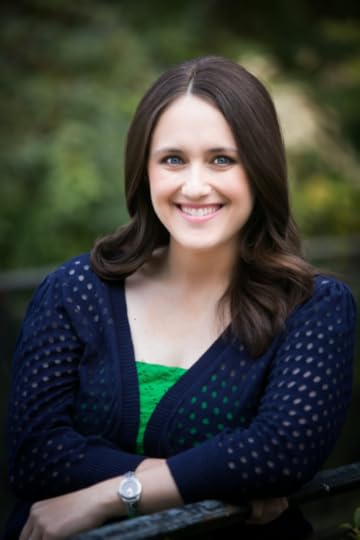




To save your time from reading my rambles: I adore this book from its fleshed out characters to the pacing of the story, from its format to its symbols. Somehow, while preparing to review this novel, I asked myself if I was reading into it too much. But what’s new?
Frame Structure?The novel explores many interpersonal and social relationships, highlighted by the numerous times Kate Garfield, our protagonist, shares her enthusiasm for theater and how her club or group of friends is different from jocks and what she calls f*** girls or boys. I might have read a number of shoujo manga that’s why I don’t find the plot unique: a shy girl, surrounded by supportive friends, gets attracted to one of the leading men, gets into a conflict with one of her friends, gains confidence and achieves her dreams, and realizes that true friendship is a treasure one cannot find anywhere. Kate in Waiting is peppered with just the right amount of twist that we get a whole new different story. But there’s something more special about the novel that successfully pulled me in, apart from who’s who that Becky Albertalli has been known for.
The novel is divided into Scenes rather than Chapters. You can argue with me that this is probably just a naming convention and I get that but I’m thinking, Kate in Waiting can be viewed as a stage production. The length of each scene is short compared to other novels and will require minimal stage backgroud and props as Kate’s story revolves around the usual places, her mother’s house, her father’s house, school cafeteria, classroom and clubroom, and of course, Kate and Andy’s special place, the BTF (Bathroom Time Forgot). The latter I assume can be prepared as if the stalls were facing the audience, and we, as readers who have VIP tickets, can see them occupying the stalls. The first person narration in present tense frames the story, giving the reader what seems to be Kate’s long stage act as a high school girl who stars in a musical…or play (If Anderson were real, he would skin me, I know). What better way for a wanna-be theater actress to narrate her story but in a stage play?
If you think at this point that I’ve certainly overread, you’re not alone.
Driving and Kate’s relationshipsIf there’s one glaring symbolism in the story (mind you, contrary to popular beliefs, I don’t just look for or come up with symbols: they are there), it’s Kate’s experience in driving and her relationships.
In a car, at least in 2021 for those who will be reading this in the future, only one person can steer and that’s the one seated in the driver’s seat, holding the wheel and pressing the gas pedal. In short, the driver is in control. Referencing this to Kate’s relationships, most of her scenes involving car rides be it Anderson’s, Ryan’s or Matt’s, show her position, not as the driver, or in this case the one who leads the relationship, but the passenger, the one who waits until she reaches the destination where the driver takes her.
Kate and AndyKate’s dependence on Anderson as the driver of their best-friend dynamic is palpable. They have something they call a “communal crush” which means, their attraction to a person depends on how much the other likes him. No matter how Kate finds someone attractive, a word from Andy saying he isn’t attractive enough will mean the same thing for her since it’s less “exciting” to have a crush without having Andy to imagine scenarios with.
She lets Andy create rules that will require them to be “happy” for the other as his or her relationship with Matt progresses. She knows this is unfair; she is aware of being dishonest to herself. Her confrontation with Andy is one of the highlights of the novel for me: here’s a passenger who realizes, the driver isn’t always in control. A passenger can get out of the car and leave (just as long as the car isn’t in motion, folks). I also find her initiative in resolving their issues noteworthy as it shows she can also steer where her relationship with Andy will go.
Kate and MattKate lets her attraction to Matt pull her along. Based on the refreshing Coke-ad description, who wouldn’t? Her relationship with Matt is like a brand new car with a brand new driver and she lets him lead her on because it feels like he knows what he is doing and where they are headed. However, unlike Andy as the driver with clear goal and direction visible to Kate owing to their long and comfortable relationship, Matt wants to head somewhere different from Kate’s expectation. Unaware of the “communal crush,” Matt attracts Kate even further with his natural charm only to confide to her his sexual orientation and unconsciously reject her. Kate as the passenger in this new friendly relationship does not have a say on this. She hasn’t been able to communicate where she wants to go yet she has to accept, no matter how difficult, that they have opposite destinations in mind.
Kate and NoahThe bus ride in the first chapters of the novel is a prelude to Kate and Noah’s dynamic. Nobody is leading, they are on equal footing, yep a reference to the scene when they walk back to Kate’s place from a party, and their destination is hidden from them until they realize where they want to go and take over this new relationship.
I haven’t forgotten that scene when Noah drives Kate home. Is this a new found symbolism of Noah driving their relationship? I don’t think so. Kate has developed so much in the story that she has become a backseat driver and in that scene, she takes control and plants a suggestion, “Can I kiss you?” and she knows that Noah won’t resist.
My Thoughts on Kate in WaitingRarely do I find a book that makes me question my rating system and this is one of them. The writing is fantastic. I like how Kate starts from being dependent on Anderson to the point when she takes a step to get him back. Her character development started from taking the chance and earning herself a spot in their musical, Once Upon a Mattress, to admitting her attraction to Matt, to owning up to her actions and spending a day with Noah, to improving her relationship with Andy.
It is the kind of novel that I know Syme, my Andy, would like and that’s the highest praise I can ever give this book.

March 31, 2021
What I read in March 2021
It was just weeks ago when I thought about changing the title of my monthly archive and now, here it is. I’m also thinking about changing the format of the post a bit with the following elements: Title/ link, short summary, and what I think about it.
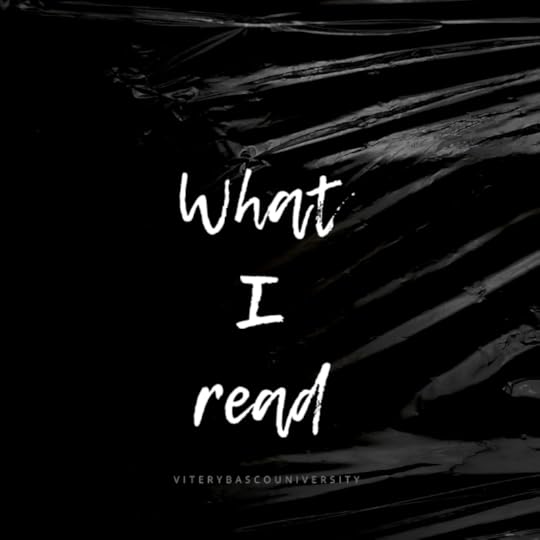
Before I give you the articles, you might want to check out my review of Josie Jaffrey’s novel, The Gilded King. I put more effort into it because of the quality of work. Anyway, let’s get it on with this month’s articles:
Why ‘star walking’ is the outdoor activity we need right now (NatGeo)What is it about: The article shares what star walking is, the benefits it entails and the places one can visit to
What I think about it: As a night-sky enthusiast, I don’t need to be persuaded to look at the night sky. It’s just a shame that since I live in the city, my night sky viewing is heavily affected by the light pollution. Going to the mountains or to the beach where I could see a big expanse of sky is overwhelming, I can cry.
Learning to code ‘will seriously change your life’ (BBC)What is it about: The title says it all.
What I think about it: My introduction to computer programming in high school wasn’t enough. Working as a business analyst has reinforced the idea that coding can open more doors for creativity. I don’t deny that having an extensive and intensive knowledge in computer programming can lead to fat paychecks, but better than this is the idea that a person who has a vision and coding skills can create a product, a program or a platform, tweak and improve it, and watch his vision come to life.
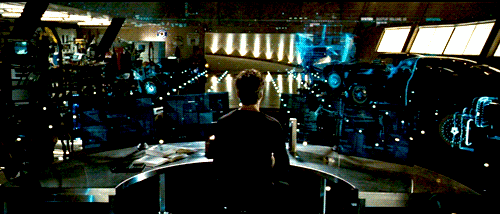 The hidden toilet humour in a Titian masterpiece
(BBC)
The hidden toilet humour in a Titian masterpiece
(BBC)What is it about: Farting in art or farting as an art.
What I think about it: I wonder since there is such a thing called overreading, there might be a thing called ‘overinterpretation’? This is only an assumption and I’d rather search for articles about stars and planets than verify this analysis of a Titian atmosphere. It was fun enough to read and my brain needed tickling. Also, I think my best friend would appreciate the humor.
The School of Athens: A detail hidden in a masterpiece (BBC)What is it about: An inkpot. Lol
What I think about it: How I missed this article in September 2020 and never included it in my archive was baffling to me. Truth be told, I appreciate this article more than the previous one because how it was written makes me understand art easier (please note that the previously recommended article and this one was written by the same person). Paintings in general hold my attention but for a minute: my eyes are drawn to them like a moth drawn to a fire or like any other person who finds an object worthy of attention. However, I don’t spend as much time looking at the details and symbols in it as a curator would. It helps when I read an interpretation and analysis that won’t baffle or confuse me otherwise I’d rather stick to just looking at the painting.
The ‘star-fiend’ who unlocked the Universe (BBC)Thinkers may think different thoughts, but their robes look remarkably the same.
Kelly Grovier, 2020
What is it about: A woman worth knowing, a certified star, Henrietta Swan Leavitt was one of Harvards old “computers” who laid the foundation for the discovery of cepheids and the law that governs the computation of the age and expansion of the universe.
What I think about it: What I found endearing was Leavitt had kept that passion for astronomy, whether it was purely out of routine or genuine interest for the stars even before women’s contribution to Science was recognized. By the salary a “computer” had that time, it was definitely a menial labor. I couldn’t even put myself in her shoes. Of course, I’d do anything to be part of a breakthrough in astronomy but in 1895-1900, I’d prefer to have a better paying job and take up astronomy as an interest or a hobby. Henrietta Swan Leavitt was truly remarkable.
Those are the articles that struck my fancy in March. For now, I’m thinking of sticking to this format. What did you read this month?

March 14, 2021
An Amateur’s Structuralist Perspective on Josie Jaffrey’s The Gilded King #UltimateBlogTour

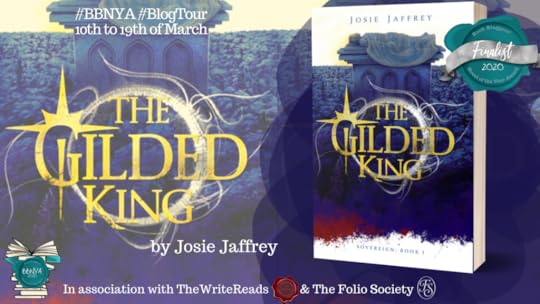 DISCLAIMER: As part of the BBNYA, THE WRITE READS PROVIDED ME AN E-ARC OF THE NOVEL, the gilded king BY josie jaffrey IN EXCHANGE for AN HONEST REVIEW.
DISCLAIMER: As part of the BBNYA, THE WRITE READS PROVIDED ME AN E-ARC OF THE NOVEL, the gilded king BY josie jaffrey IN EXCHANGE for AN HONEST REVIEW.BBNYA is a yearly competition where book bloggers from all over the world read and score books written by indie authors.
If you are an author and wish to learn more about the 2021 BBNYA competition, you can visit the official website (https://www.bbnya.com/) or our Twitter account, @BBNYA_Official. If you would like to sign-up and enter your book, you can find the BBNYA 2021 AUTHOR SIGN UP FORM HERE. Please make sure to carefully read our terms and conditions before entering.
If you are a book blogger or reviewer, you can apply to be part of BBNYA 2021 by filling out this form (also remember to read the terms and conditions before signing up)!
BBNYA is brought to you in association with the Folio Society (If you love beautiful books you NEED to check out their website!) And the book blogger support group TheWriteReads.




In the Blue, the world’s last city, all is not well.
Julia is stuck within its walls. She serves the nobility from a distance until she meets Lucas, a boy who believes in fairytales that Julia’s world can’t accommodate. The Blue is her prison, not her castle, and she’d escape into the trees if she didn’t know that contamination and death awaited humanity outside.
But not everyone in the Blue is human, and not everyone can be contained.
Beyond the city’s boundaries, in the wild forests of the Red, Cameron has precious little humanity left to lose. As he searches for a lost queen, he finds an enemy rising that he thought long dead. An enemy that the humans have forgotten how to fight.
One way or another, the walls of the Blue are coming down. The only question is what side you’ll be on when they do.
Author’s Bio, lifted from her website: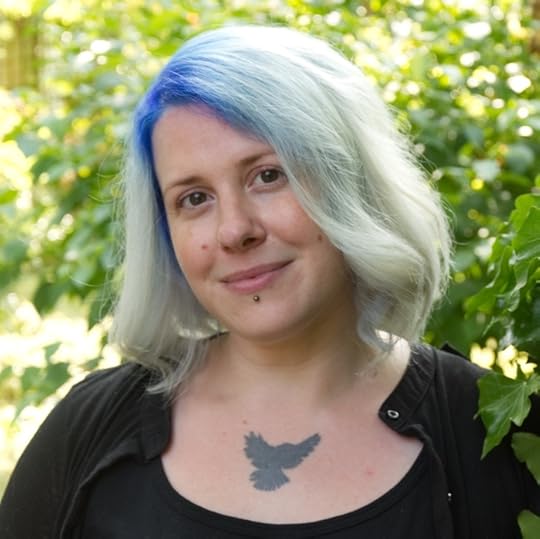
Josie is the author of nine self-published novels plus short stories. She is currently working on a range of fantasy and historical fiction projects (both adult and YA), for which she is seeking representation. Ultimately, she hopes to be a hybrid author, both traditionally- and self-published.
After finishing her degree in Literae Humaniores (Classics) at the University of Oxford, Josie wasn’t sure what to do with her life.
She slogged through a brief stint working for an investment bank in London during the 2008 credit crunch, then converted to law and qualified as a solicitor specialising in intellectual property. She worked at a law firm for five years before moving to a UK-based international publisher in 2016. Whilst she loved law, in the end she didn’t love it quite as much as writing, which she now does almost full time.
Josie lives in Oxford with her husband and two cats (Sparky and Gussie), who graciously permit human cohabitation in return for regular feeding and cuddles. The resulting cat fluff makes it difficult for Josie to wear black, which is largely why she gave up being a goth. Although the cats are definitely worth it, she still misses her old wardrobe.
The 5(ish)- Minute Book Review (if you aren’t in the mood for a long post)Binary Opposites and Symmetry in The Gilded KingBefore proceeding, here’s another disclaimer: I’m a vampire noob. My knowledge goes as far as Dracula’s and Lestat’s names- Vincent Valentine if you consider him one. I don’t gravitate towards vampire literature for no specific reason similar to how a number of people turn up their noses at other young adult fantasy novels *coughs in Harry Potter*. Reading The Gilded King eased me into this uncharted realm – the fact that I didn’t read the whole invitation tweet for the blog tour was partly to blame. With that said, let’s get it on with my amateur two cents on Josie Jaffrey’s novel.
The StructureJosie Jaffrey’s storytelling is superb.
Each chapter shows a limited perspective based on the featured character, not unlike an episode in a TV Series. It’s telling something without giving everything away and as a reader, I appreciated how the plot thickened all the while I was concerned about what each character was doing. Given the structure, I could only see the whole plan coming to fruition as Cam was unraveling it and as Julia was suffering from it. The effect was perfect. Those like me who often had thoughts like, “Don’t be stupid, don’t go there!” or “He’s the villain!” will enjoy the pacing.
Also, The Gilded King, though the first novel in the Sovereign Series, is but one of the novels created to build the world of the Silvers. A reader gets bits and pieces about the world but not everything, just enough to pull you in, help you understand the story and make you want to read and know more.
Red and Blue as Colors, as PlacesBlack and red are colors often associated with vampires but in the novel, Red and Blue are the colors that hold significant meanings. Red’s meaning in a novel about vampires hardly needs to be explained (blood, hello!) but it gets an additional context in The Gilded King similar to how red signs are taken today: red light means ‘stop’, CAUTION or WARNING signs are inked in red. Red is the name of the dangerous area outside Blue. How dangerous it is to the citizens of Blue, I can’t tell you without spoiling the story. To go to the Red border means death for the citizens of Blue. It is a place Julia, one of the protagonists, yearns to go to but never sets foot in. Red in the novel equates to chaos.
Blue on the other hand signifies peace and order, something that the Silvers in the city would like to keep. The seemingly harmonious relationship of the Silvers and their Attendants also contribute to the meaning of the color. Not to mention that it is also associated with aristocracy. In Blue, there is a social hierarchy where Silvers are Nobles and humans are Servers. This is where the role reversal occurs: Silvers cannot exist without the Servers’ pure, uncontaminated blood so the former will protect the latter at all cost which tells us, a Silver’s servitude can also be bought by blood. Perhaps Blue isn’t only the representation of the Silver’s nobility but of the importance of the Server’s blood.
The tension between these two places, Red and Blue, is emphasized when Julia attempts to leave (there goes one spoiler) but utterly fails as her courage betrays her. This tension builds up until it culminates with Red breaking through the Blue’s borders.
Silver and GlassWe’re Silver, so we’re metal right? … we’re strong, but we corrode. The humans … are breakable … but they’re the ones who’ll survive for millennia, not us.”
Lorelai, The Gilded King
As previously mentioned, Silvers, with their strength, beauty and immortality, are a sort of nobility and humans treat them as such. Some revere them, others detest them. Meanwhile, humans are mortal and in the world created by Jaffrey, subject to servitude. With my description, you’d think a Silver outclasses a Human- the Nobles in Blue encourage this- however in the story it is more complicated than that as their relationship is more symbiotic rather than predatory. Although human beings are considered servers, the irony lies in the Silver’s dependence on their “attendants” for their immortality. Without pure blood, they’d die of hunger. Contaminate that blood and the Silvers would run out of food. Force them to drink contaminated blood, the Silvers would lose what makes them special. Human beings, primarily uncontaminated, on the other hand, depend on the Silver’s power or perish. They either choose to live their lives controlled but protected by the Silvers or escape from Blue and suffer consequences like blood coming out of their eyes and mouth. To complicate the relationship even further, a noble can easily suck up their attendants blood when uncontrolled and the blood of a human being who has eaten food from Red can ‘cure’ a Silver and turn the latter into a normal human being.
Cam and JuliaJulia and Cam are both central figures in The Gilded King. Both are smart, curious and faithful to a fault. Cam, the Silver protagonist, actively pursues what he believes is his remaining purpose to find Emmy while uncovering a plot brewing outside the unsuspecting civilization of Blue. Meanwhile, Julia, the human protagonist, tries to resist her destiny by going against some rules, going as far as to plan an escape from Blue. They cherish their friends, in Cam’s case Emmy, in Julia’s case, Claudia, and will do anything to protect them.
Their similarities don’t end there. Julia and Cam meet their love interests, or what they appear to be (remember, this is but the first novel in the Sovereign series), from groups outside their own which mean potential danger for either of them. Lucas, Julia’s Noble, is a young Silver, whereas Felix is a Contaminated. I don’t have to tell you that the difference in their respective classes, though partially touched, is a conflict waiting to explode in the next novels.
Apart from how each of the love interests’ breath smelled like ‘mint and honey’, I couldn’t find any element that isn’t relevant to the whole picture. The fact that it took me a while to finish reading the book was more about my preference rather than the material. As I don’t read romance novels about vampires, I applaud Jaffrey’s ability to get me hooked.
Given the chance, I would want to read the next installment or other books related to The Gilded King. It would be fantastic to revisit the world Jaffrey created. Here comes the however statement: I have a number of books waiting to be read and reviewed. I want to finish my Harry Potter-Lord of the Rings-Sherlock Holmes marathon and I have signed up for another blog tour in May. These may sound like lame excuses but I sincerely want to finish Jaffrey’s series. In fact, I have a number of questions I need to be answered: 1) What happens to Cam and Felix? 2) Who’s Emmy and how important is her role? 3) How will Lucas and Julia survive in this dystopia. All these thoughts coming from someone who does not care about romance and vampires. That is saying something.
 Blog Spotlight:
Blog Spotlight:The Gilded King by Josie Jaffrey| BBNYA Blog TourBlog Tour Review: The Gilded King by Josie Jaffrey
https://shelvesofstarlight.wordpress.com/2021/03/12/the-gilded-king-blog-tour/
March 2, 2021
February 2021 Articles

I’m thinking of changing my monthly archive title to What I Read in *insert Month* but before such change can happen, I must focus on writing more consistently. No use in having a title without a post, right?
If you haven’t, do check out my review on Flynn Meaney’s Bad Habits. It’s my first time taking part in a blog tour and I have to say I did better than I expected I would. A longer post may be required to encapsulate my thoughts and perhaps, I need more experience as well.
Without further ado, here are the articles I read this month:
Mount Everest is more than two feet taller, China and Nepal announce (National Geographic)Am I really interested in knowing Mount Everest’s height? Am I planning to visit it? Does it have any significance in my life? The answer to all these questions is a resounding no. How geographers or surveyors measure it is what I deem noteworthy here. It has satisfied my curiosity and sparked others like how fast do mountains in other countries or even planets grow.
Can privacy coexist with technology that reads and changes brain activity? (Science News)It is fascinating to know how people value privacy and reject the idea of manipulation when they casually air their dirty laundry in different social media platforms and allow their behaviors to be influenced by what programs and advertisements they watch. Ethics may play as a gatekeeper in scientific advancement but given that it is subject to change, I don’t find it particularly reliable.
(NASA)This article explains NASA’s vision in collecting Earthling Names and sending them to Mars and the technology that made it happen. I share the dream of being an astronaut with the guys in The Big Bang Theory and although I have long accepted that space exploration is not something I can attain in my lifetime, having my name in one of Perseverance’s silicon chips is enough.
I have another book scheduled for a review in March so if you find this February Archive bland, you can look forward to that. Ciao.

February 17, 2021
A Case of an Unreliable Narrator: A Review of Flynn Meaney’s YA Novel, “Bad Habits” #TheWriteReads #UltimateBlogTour

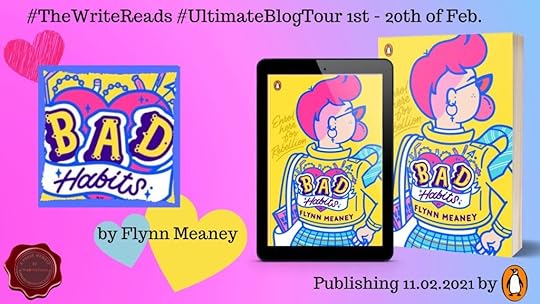 Disclaimer: The Write Reads and NetGalley provided me an e-ARC of the novel, Bad Habits by Flynn Meaney in exchange of an honest review.
Disclaimer: The Write Reads and NetGalley provided me an e-ARC of the novel, Bad Habits by Flynn Meaney in exchange of an honest review.




Hilarious, bold, sparky and surprising, this is the funniest feminist book you’ll read all year.
Alex is a rebel from the tip of her purple fauxhawk to the toes of her biker boots. She’s tried everything she can think of to get expelled from her strict Catholic boarding school. Nothing has worked so far – but now, Alex has a new plan.
Tired of the sexism she sees in every corner of St Mary’s, Alex decides to stage the school’s first ever production of The Vagina Monologues. Which is going to be a challenge, as no one else at St Mary’s can even bear to say the word ‘vagina’ out loud . . .
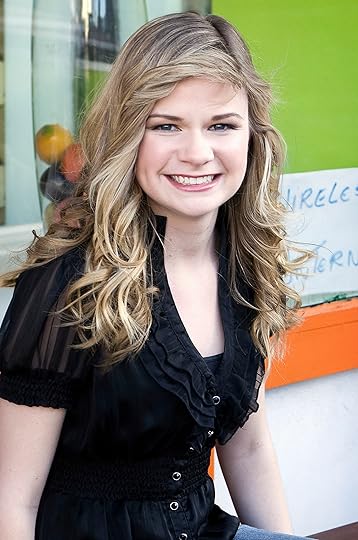 Author’s Bio, generously provided by The Write Reads:
Author’s Bio, generously provided by The Write Reads:Flynn Meaney is the author of The Boy Recession and Bloodthirsty. She studied marketing and French at the University of Notre Dame, where she barely survived the terrifying array of priests and nuns, campus ghosts, and bone-crushing athletes who inspired Bad Habits. Since completing a very practical MFA in Poetry, she works for a French company and travels often between New York (when she’s in the mood for bagels) and Paris (when she’s in the mood for croissants).
The 5-Minute Book Review (if you aren’t in the mood for a long post)Alex Heck, The Unreliable NarratorThe book being narrated in first person perspective has a lot of emphasis on Alex, a self-proclaimed feminist, being that “bad bitch” and often times, it appears as if she was trying so hard not to fit in in St Mary’s, her Catholic boarding school–as if she was trying to convince the reader that she, Alex, was a certified bad-ass and, by doing so, convince herself that she actually was. I posit that it works the other way around as well. Perhaps, by trying to convince herself that she was this persona she created, she could make people around her believe that she wasn’t just a regular student who blindly followed the strict rules enforced in St. Mary’s. After all, being different is a one widely used fiction trope, and Alex wants to assert her individuality in St. Mary’s while abiding the tenets of what she identifies as feminism.
Alex Heck is a good example of an unreliable narrator, a picaro, and I’m going to break down her subjectivity in three parts: language, created persona, and view on Feminism.
Language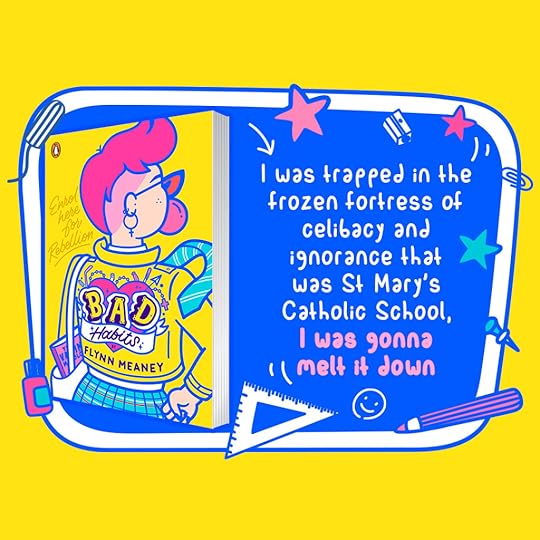
Vulgar may not be the right word to describe Alex’s chosen language. Taking in the setting of the story, St. Mary’s, a school Alex describes as rigid when it comes to rules may they be dress code, curfew, or extracurricular activities, it is not a surprise that our rebel protagonist proclaims her uniqueness by dropping the word vagina. What impact does Alex want? She may be trying to educate anyone who’d listen to her about the female genitalia or she is in it- the habit I mean, not the vagina- for the shock factor but certainly, that doesn’t make her vulgar, right? It so happens that it appears so because she is in a Catholic boarding school where flowery words are used in place of vagina.
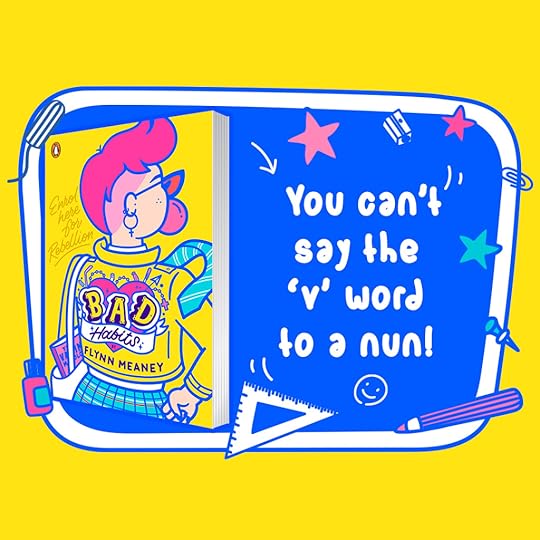
The novelty wears off, however, after seeing the ‘V’ word mentioned at least twice in a chapter along with the motorcycle boots she is clearly fixated in. The readers already know that she doesn’t pull her punches in her graphic descriptions so why the insistence? Does she think she will get expelled because of the ‘V’ and ‘F’ bombs and cusses? Is it perhaps to strengthen the belief that she is an open-minded, more experienced feminist? Or is it to provide a foundation, a twist, for what’s going to happen in Chapter 21? My impression, and I may be totally judgmental or wrong here, is she simply wants to say “I, being a feminist, am superior than you because I can say these things that you wouldn’t dare say and do things that you wouldn’t do.”
Apart from deliberately choosing the words that will make her stand out from the otherwise unexciting world she is in, Alex also has the habit of putting words in Mary Kate’s mouth. I understand that best friends may have similar manners and expressions but Mary Kate’s outbursts during the worst moments of her scenes in the novel sound remarkably similar to how Alex phrases her expressions. In fact, the only time Alex regards Mary Kate as an equal is when the latter talks down to a guy and shouts the word- yep, you guessed it, “vagina” in a stadium full of spectators.
Created PersonaWith Alex’s choice of language is the creation of her persona. She wants to be identified as strong, independent, and most importantly different. Yet, she struggles because she believes her society, St. Mary’s, wants to squash her fire. What does she do? She takes a leap from wanting to get expelled to wanting to become a pinnacle of change at school. She deliberately fights it, head-on, with staging The Vagina Monologues, painting her recruitment banners with a graphic representation of a vagina, and refusing to make way for the school’s marching band (Get your copy of the Bad Habits to know if Alex actually succeeds in these scenes).
I do admit Alex’s outburst in the tampon scene has made me chuckle since it makes a lot of sense:
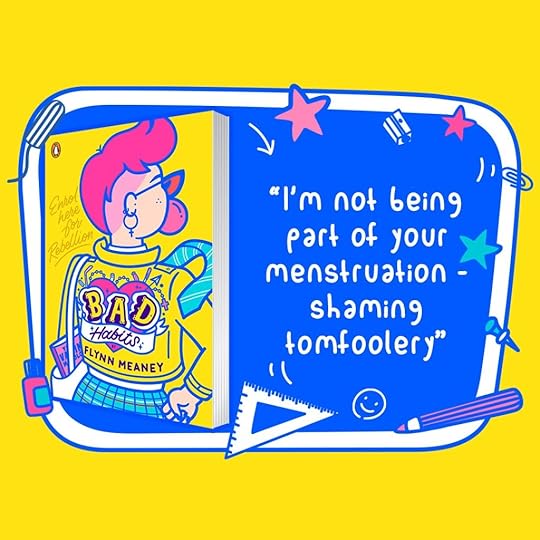
Her description of the scene is a classic picaro– an unreliable narrator who likes to exaggerate- a strong female character who has left a lasting impression on some hockey players but Alex has played it well. She makes a valid point that purchasing a box of tampons is not different from buying crisps and must be considered normal.
Alex’s persona cracks when she, for all the open-legged puns and adjectives she uses to describe her day to day experience in St. Mary’s, decides to keep mum about her intimate relations with Pat, driving it to a corner with only a lip lock and a line about a thong. Alex has openly discussed her sexual relations before. Not only to the readers does she hide this but I can’t recall her talking about their relationship or the lack thereof with Mary Kate, her best friend. There may be several reasons why: first, she doesn’t think sex is that important, second, she doesn’t want Mary Kate to know to avoid judgment, third, she thinks what she and Pat have is intimate enough to warrant secrecy. We know the first is not the answer, the second is questionable since her persona isn’t afraid of being judged, leaving us the third option. I can’t deny that the author or editor’s choice to leave that out of the novel might have played a big part *coughs in YA* but taking the text as it is, wouldn’t it be more of Alex’s persona to kiss and tell yet she does not. What she shares in her internal monologue instead are those moments like exchanging messages, working on a common goal, spending her time with Pat and thinking he is attractive- all these coming from a rebel who spends her time scorning at the idea of a pure relationship.
View on Feminism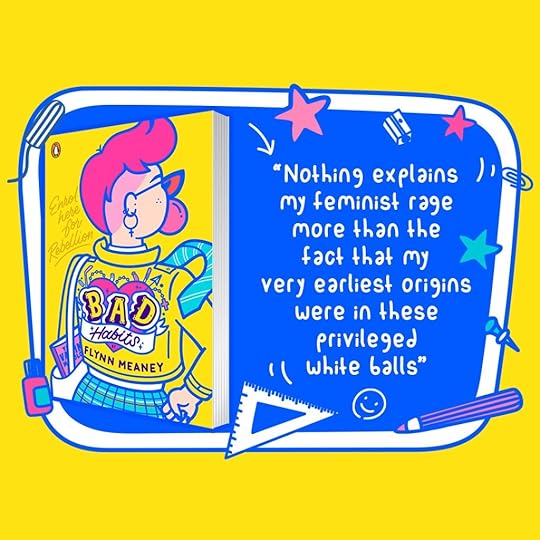
Should I put the blame on her age like any person from the older generation attributing the mistakes of the younger generation to their lack of experience? Feminism is not just about reading and staging The Vagina Monologues and Alex, with her lack of exposure to other key concepts of feminism, does not recognize this until the end of the novel. What she fails to realize is that the amount of devotion she has for the monologues is comparable to the nuns’ and priests’ devotion for the school rules, Mary Kate’s earnestness in search for her one love while maintaining good grades, and the hockey team’s drive to win the interschool competition.
Her perspective of feminism and Catholicism is black and white, two opposing forces that reject each other. It appears that for Alex, feminism begins and ends with being proud of, taking care of, and talking about one’s vagina. She refuses to acknowledge the strength and wisdom of her peers, even stoops down to belittle Katie Casey, a prim and proper lady, who turns out to be very comfortable with her own skin. Even, Mary Kate, who Alex calls brilliant and intelligent to cajole her in staging The Vagina Monologues, has been reduced to nothing but a girl who wants to have a boy friend by the end of the semester. Due to her narrow ‘You don’t pay attention to the Feminist Club so you aren’t feminist’ perception, she has confined the women in St. Mary’s into categories, taking for granted what the essentials are in feminism: equality between men and women and the women’s freedom to choose their own interests regardless of their status.
My Thoughts on Bad Habits and its Unreliable NarratorYA readers such as myself have already learned to anticipate bildungsroman in novels. That is what we are here for, the ultimate twist, the big character development. Alex, being the picaro narrator of Bad Habits provides just that. As a character, despite being hilarious at times, she may not be my cup of tea. I certainly wasn’t rooting for her and it was difficult and tiresome to empathize with her objectives. However, reading between the lines, deciphering what she wants to say as opposed to how she delivers, I find that the novel has a good foundation. The presence of the other characters like the charismatic Pat, the cool-headed Katie Casey and the multi-faceted Mary Kate has made the entire novel entertaining and Alex’s epiphany worth the wait.

February 7, 2021
January 2021 Articles

By now, you’ve read a number of articles about how terrible twenty-twenty was so I won’t go into details how it went for me. Suffice it to say, I managed to survive and am currently enjoying the benefits of telecommuting.
I finished reading Harry Potter books #3 and #4 this month and currently reading The Order of the Phoenix. Does that sound like I’m making excuses for not being able to read more articles? Definitely.
Why are we learning languages in a closed world? (BBC)Being a language enthusiast- dare I call myself this when I only know basic Korean and fundamental Japanese?- I find it fascinating to know other people’s reasons behind learning new languages. Quarantines might have made it to the list, boredom might be another, but the article mentions people wanting to keep their brains active. This is definitely saying something. If before, people only wanted to stay at home and relax by watching Netflix shows, now people want to learn something.
The Shortness of Life: Seneca on Busyness and the Art of Living Wide Rather Than Living Long (Brain Pickings)Since I have lurked in Brain Pickings for several years, sometimes the articles I include in my current archive might have already been included in my other posts. I have to admit that this article looks familiar.
Learning how to live takes a whole life…
Seneca
What quarantine has taught me is being productive is overrated and people can choose their preoccupation and that whether we are being productive is a question we ask when we compare the result of our efforts against the effort of others. There isn’t any uniformity in how people use their time so qualifying the ‘quality’ of life based on how much work I finished in one day or how much rest I got on a weekend is a futile yet endearing exercise.
The most ancient supermassive black hole is bafflingly big (Science News)There are so many things we have yet to learn about black holes. Though the power they hold is still scary, I can’t deny that they are fascinating. Perhaps, it is because there are still so much to learn that is why they remain fascinating.
I’ve been so engrossed in reading the Harry Potter novels and playing Genshin Impact that I haven’t gotten around to reading more articles. However, I have another post in partnership with the The Write Reads on Twitter scheduled on the 18th of February so look forward to that. Ciao.

January 4, 2021
November – December 2020 Articles

Happy 2021!
In November 2020, WordPress sent me a badge for being with them for seven years. Look at that! Seven years of toil and inconsistent posting and I earned a badge!
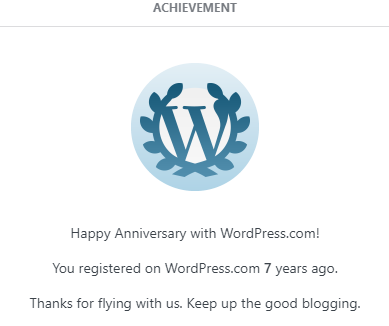
It was ironic that I wasn’t able to post a monthly archive of articles in November. The laziness went on until the beginning of the holidays, when overconfidence kicked in and the “I can finish this during the Christmas break” lived in my head rent-free.
Then, Genshin Impact happened.
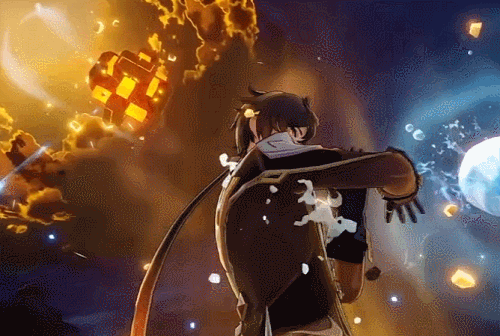
I decided to stop trying to create an archive for November and stop cheating myself in the process (I had the same concern last year and created November-December 2019 Articles, it’s starting to become a pattern), so here’s a rundown of the articles I found read-worthy.
One of Jupiter’s icy moons may glow in the dark (National Geographic)
What I find interesting in this article, apart from the fact that it is about one of Jupiter’s many moons which in itself is very interesting, National Geographic’s interactive moon can be dragged as necessary to examine the celestial body’s different parts. The several years of observation and studies and the amount of money put into Astronomy and software design have led to this moment: audience can now simply swipe left or right, press their digits on their mobile devices and see Europa’s “salty” Tara Regio.
The physics that suggests we have no free will (BBC Reel)
Not an article but a video talking about how big numbers and patterns generated over time could counter what people think of coincidence and free will. Why have I included it in the list? Free will.
Why Swedes don’t speak to strangers (BBC)
I do love articles that give the response to their click-bait titles in the first paragraph. I also adore how the Swedes call small talk. Read the article to find out what term they use! Nowadays, however, given the different levels of quarantine enforced, the need for small talk is justified. People want to socialize even more. Looking at it from a different perspective though, given the small window of opportunity to communicate, wouldn’t it be better to talk about something actually meaningful? That’s a trend in social media- highly opinionated folks behind a platform can be “doctors”, “politicians,” or “experts” yet in their real lives, they can only manage to say, “The weather is fine!”
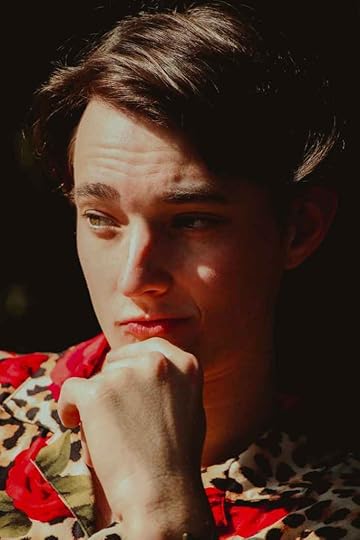 Photo by Talal Hakim on Pexels.com
Photo by Talal Hakim on Pexels.comYou do you, guys. Free will.
Why the ‘paradox mindset’ is the key to success (BBC)
David Robson has become one of my favorite article writers. I think I have already written that somewhere in this blog.
This article in particular reminds me of one I wrote two years ago for a colleague who asked me to choose between career advancement and internal motivation (read Passion vs. Strength here). Upon reading the BBC article, I have come to realize that I was already exploring the paradoxical concept between doing well in one’s career and relentlessly pursuing one’s goal.
‘Cottagecore’ and the rise of the modern rural fantasy (BBC)
The 2006 rom-com movie “Holiday” immediately came to my mind when I read this article.

People’s deep-seated passion for crafts and aesthetics resurfaced in the middle of the COVID crisis. These interests take our minds off the situation way beyond our control. Somehow, through devoting our energy to them, some of us find joy, contentment and peace away from the bustling city-life (even when we’re still technically living in our respective cities).
The solar discs that could power Earth (BBC)
Wouldn’t it be nice to optimize green energy? Imagine harnessing the full-potential of solar energy to provide free electricity to mankind! Now, imagine having that resource without big corporations taking advantage of citizens. I know I’m asking for too much. Such a big project requires funding and it is inherently a business, but ideally, this project will have a great impact.
Accidentally Wes Anderson: When real life meets film fantasy (BBC)
Fact versus Fiction: Which is better?
I’m not familiar with Wes Anderson nor his works and consulting Wikipedia has made me realized how little I know about the movie-industry in general (often limited to pop-culture and Oscar-winning tropes). However, I could relate to the ‘chicken-or-egg’ question. Which inspires which? We know historical literature is definitely inspired by what’s going on. Needless to say, some years from now, we’ll have works about the 2020 pandemic that struck the world. On the other hand, we have a number of literature that inspire or somehow “foreshadow” what eventually happens.
[image error]
The thing is, we can’t call it accidental when we’re actually looking for it, can we?
HAYABUSA-2: Pieces of an asteroid found inside space capsule (BBC)
An episode from the Big Bang Theory comes to my mind: Leonard insisting to use his laser as a better option for cutting an asteroid Bert found. What if there was something inside that asteroid that could potentially harm living beings? But then, people working with these things are scientists. They know what they’re doing much more than I do.
The benefits of embracing deep time in a year like 2020 (BBC)
Once or twice, you may have found yourself wondering what your city looked like several years ago or how it would look like twenty years from now. According to the article, this is what “deep time” thinking is like. Looking at photos of Machu Picchu, watching the moon and stars, and hearing about natural disasters such as earthquakes and volcanic eruptions propel me to these thoughts. Thousands of years ago, an ancient civilization flourished on top of mountains only for their houses to be regularly visited by tourists. Outside of our solar system, there are a number of stars and planets that formed billions of years ago that the history of mankind appears incomparable. Table-top mountains look amazing and regal these days but centuries ago, they might have looked like the plains we don’t give a second glance. It only took several years of tectonic plate movement and here we are admiring them.
It helps to put things in perspective that the world will continue to exist for billions of years without human beings.
I’m still in the middle of re-reading my Harry Potter novels as part of my Harry Potter annual marathon. I don’t read as fast as I used to– I blame my current distractions (Youtube, Netflix and Genshin Impact). This may sound like an alibi for the would-be absence of January 2021 articles but we’ll see.

January 1, 2021
2020 Highlights
February
March
April
I designed an Enrollment System.
May
June
I quit my job.
July
I created my Youtube account.
August
I finished an introductory course in Programming and published my game.
Hit my 1000 skips milestone
September
I started working for Globe Telecom through an agency.
October
I reinstated my insurance.
November
December

__ATA.cmd.push(function() {
__ATA.initDynamicSlot({
id: 'atatags-26942-5fefbe0761e61',
location: 120,
formFactor: '001',
label: {
text: 'Advertisements',
},
creative: {
reportAd: {
text: 'Report this ad',
},
privacySettings: {
text: 'Privacy',
}
}
});
});
November 14, 2020
Thoughts: Deciding on my 2021 Journal
Having an open communication with yourself will give you fruitful rewards so I highly recommend it.
A wandering thought suddenly crossed my mind as I was preparing myself for work: should I start searching for a 2021 Journal?
Normally, in the beginning of November, I’d start collecting Starbucks stickers for their annual journal, if the journal design was worth the cheapest cup of coffee multiplied by the number of sticker requirement. Should a random, generic bookstore journal prove to serve my purpose–which often does, I just use the journal as a freebie to my coffee, really,–I wouldn’t hesitate picking that up instead.
Since the several reinforcements of quarantine in my city, I have only visited Starbucks twice so definitely, earning stickers is not an option. You’d think it’s easier to decide now after an option has been eliminated. Alas! With the folly of a person with access to eCommerce, I am left with a number of factors affecting my decision between traditional and digital journals:
[image error]
Accessibility and Consistency
Like any other person affected by the work from home set up and currently enjoying it, I spend more time with my laptop more than with real notebooks and pens. I still have an affinity for traditional writing instruments although I no longer hoard them (Read Top 10 Things I don’t Buy Anymore). The time I usually spend on journaling (about thirty minutes a day) I spend on my PS4 console when I’m not working – a necessary distraction, I might add. However, I can’t always reflect on an article I’ve read or a line from a book or a movie I like by conversing with my playable character.
What makes a digital journal handy is with a swipe of my fingers, I may easily access my journal and type away. Writing on a fresh page of paper is quite therapeutic though that a tablet and smart pencil cannot provide- I can’t actually sniff my tablet when I turn a new page, can I?
Templated or DIY
Not for lack of trying but I think it is so much easier when I don’t have to think about dates or creating calendars so I lean towards dated planners and diaries. The dates also help psych me up to write more. The downside to them is, I waste a ton of paper every year since I can’t fill all pages which is counterproductive.
You might have surmised by the pattern of my post updates, I may not be the best example of a person who values consistency. Achieving consistency in writing is one of my ultimate goals. How I get to that goal is another issue. So far, I only commit myself to one blog post at a time. Dated planners and journals, digital or traditional, appeal to that overachiever side of me that wants to comply with a requirement.
I cannot deny however, that DIY journals particularly the bullet journals are hyped for a reason. They do foster creativity and productivity among those who practice them so they serve their purpose.
Privacy and Storage
There are things an individual does not want to share with anyone who is into journaling or diary keeping. Why document those thoughts in the first place? Believe it or not, my head feels it is about to burst when I try to hold everything in. It needs and deserves an outlet that is safe from prying eyes. Traditional journaling is quite prone to invasion of privacy – we’ve learned this from television series that exploited the idea that one’s identity can be certified by a diary (Read What’s the difference between a diary and a journal?). Does a digital option sound better now? A free application sounds promising? I’m pretty lazy reading those privacy clauses that can easily trap anyone who isn’t familiar with how encrypted data can still be decrypted. I’ve also learned from some known Cloud security breaches that only the lack of celebrity status can keep my information safe. Would hackers actually spend time reading through files and data of a nondescript person like me and earn money from it?
Digital journals, free or paid, DO offer something better than traditional ones: the long term storage. Traditional journals and planners, even when they are hardbound, can be torn, wet, set on fire, lost, or scrawled on–the last by one’s niece or nephew. I wouldn’t want to spend so much time making my journal and risking it getting destroyed or thrown away after five years, would I? With cloud storage, apart from the privacy concerns, I am assured that no matter what device I use, I can access my journal any time–as long as I remember my password in the next five or ten years.
I’m still on the fence about what to choose for 2021: must I go with a DIY Journal (inspo available in Pinterest and Youtube) or simply take advantage of Google Calendar as that’s free and very much available. Stay tuned for updates on this one. You don’t have to wait long as we only have one month left for 2020, the year when time has flown so fast.
[image error]







